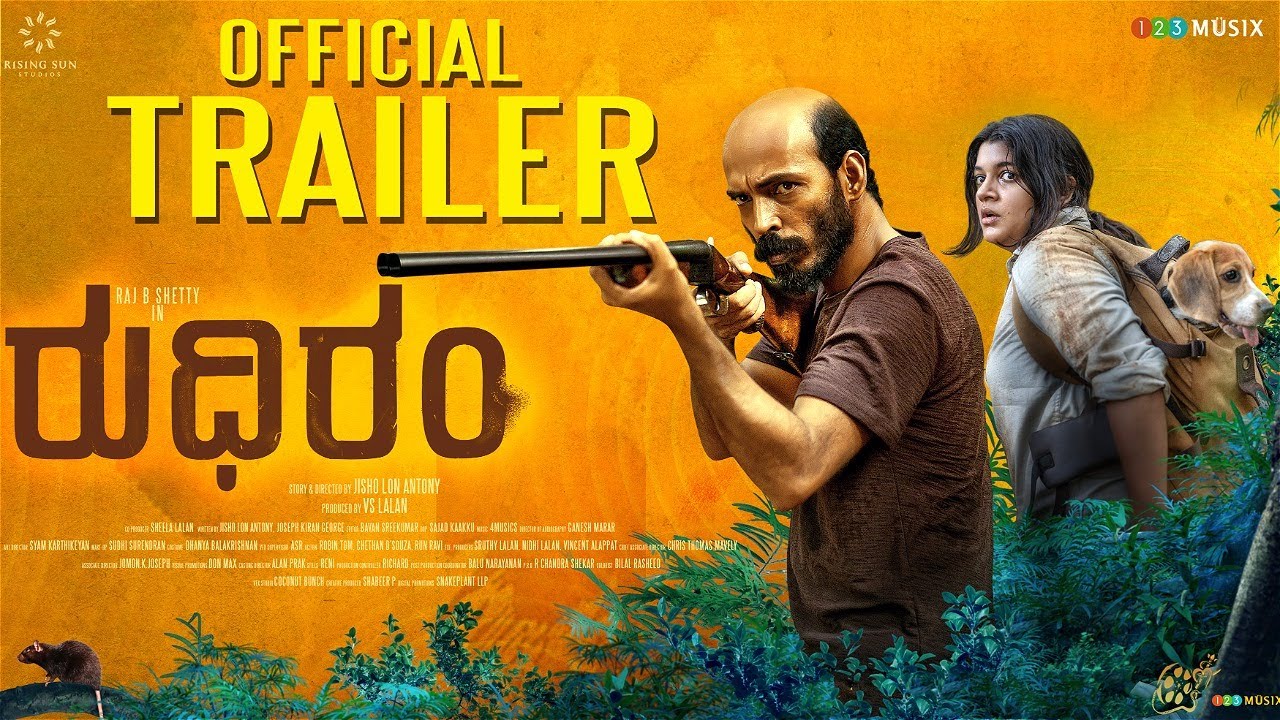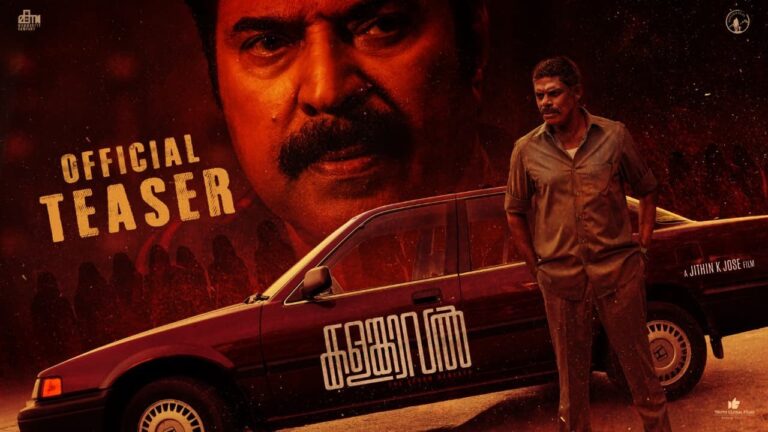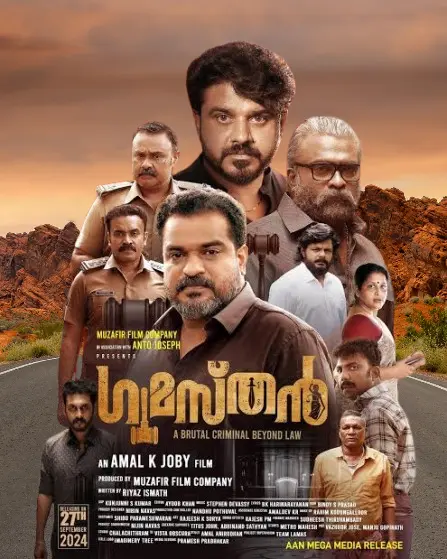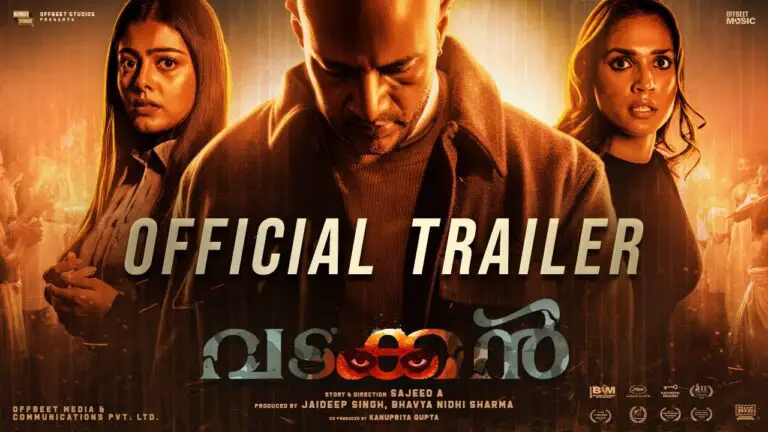Rudhiram Movie 2025 Bapamtv Review Details
Rudhiram (2025) — A Director’s Grit: Jisho Lon Antony’s Vision Unpacked
Rudhiram is a tightly wound Malayalam survival thriller that leans into mood, menace, and slow-burn revelation. Director Jisho Lon Antony stages a psychological cat-and-mouse game that asks the audience to sit with discomfort.
Plot & Narrative Structure
The film centers on Swathy (Aparna Balamurali), a captive fighting to survive, and Dr. Mathew Rosy (Raj B. Shetty), an unpredictable tormentor. Flashbacks and non-linear beats peel back motivations while keeping much deliberately ambiguous.
The screenplay favors atmosphere over exposition, using memory fragments to gradually reveal trauma and revenge. That structural choice heightens suspense but sometimes lets shock moments overwhelm quieter emotional scenes.
Cast & Key Performances
Raj B. Shetty crafts a chilling, layered antagonist through physicality and micro-expressions. His Mathew is equal parts menace and fragile menace, which keeps viewers off-balance.
Aparna Balamurali anchors the story with a performance that evolves from terror to a hardened resilience. Her arc provides the film’s emotional through-line and humanizes the larger thematic aims.
Directorial Choices — The Heart of Rudhiram
Jisho Lon Antony’s signature move in Rudhiram is mood-first storytelling. He prioritizes sustained tension over conventional plot beats, letting visuals and sound do heavy lifting.
Non-linear editing and measured reveals are used to control what the audience knows and when. This keeps sympathy and suspicion in flux, forcing active engagement rather than passive viewing.
Use of Space and Claustrophobia
The director turns natural environments into pressure chambers: forests, enclosed rooms, and rigid close-ups translate internal states into physical space. This theatrical use of environment is a clear, intentional stylistic choice.
Antony often frames characters against looming canopies or tight interiors to convey the psychological weight of captivity and memory. These frames become an extension of character psychology rather than mere backdrop.
Influences and Inspirations
Rudhiram gestures toward survival dramas and psychological thrillers while borrowing classical motifs of trauma and redemption. There are echoes of dark, character-driven thrillers where atmosphere substitutes for exposition.
Antony’s approach recalls directors who use visual texture and sound design as narrative tools—placing Rudhiram within a contemporary art-house thriller lineage. Yet, he also adapts local storytelling rhythms to keep the film grounded in Malayalam cinema traditions.
Comparison to the Director’s Previous Works
Compared to Jisho Lon Antony’s earlier films, Rudhiram shows a bolder appetite for sustained discomfort and technical ambition. Where earlier works might have balanced pace and empathy more evenly, this film tilts toward formal risk-taking.
That risk pays off in visual and performative moments, though it can undercut pacing for viewers expecting linear catharsis. The film feels like a confident step forward in Antony’s cinematic voice, albeit an occasionally uneven one.
Signature Elements — What Marks This as an Antony Film
Recurring signature elements include layered soundscapes, brooding color palettes, and careful framing that prioritizes tension. Antony’s preference for ambiguous moral orientations—blurring hero and villain—appears again here.
He favors small, intimate moments of character detail over sweeping explanations, trusting actors and technical craft to communicate subtext. Those choices mark Rudhiram as recognizably his work.
Cinematography & Visual Language
Sajad Kaakku’s lens work complements Antony’s vision with claustrophobic compositions and striking aerials. The spiraling tree-canopy shots contrast with oppressive interiors to create a visual grammar of threat and escape.
Color grading by Bilal Rasheed leans into muted tones and gritty textures, reinforcing a sense of grit and unease. These visual decisions support the director’s intent to keep mood at the forefront.
Sound, Score & Editing
4 Musics and collaborators build an ambient score that heightens dread without dominating scenes. The sound design—by Ganesh Marar—makes silence as expressive as noise, a clear directorial instruction to listen.
Bavan Sreekumar’s editing weaves past and present in a purposeful rhythm, though the jumpy beats sometimes risk disorienting the emotional through-line. Still, the editorial choices serve Antony’s aim: to fragment memory and reveal trauma slowly.
Screenplay & Dialogue
The screenplay (by Jisho Lon Antony and Joseph Kiran George) leans minimal—dialogue functions sparingly, often letting silence and gesture carry meaning. When words do arrive, they are carefully placed to alter understanding of characters.
This sparse dialogue is a double-edged sword: it deepens mystery but occasionally leaves narrative threads feeling underexplored. The choice aligns with the director’s preference for implication over literalism.
Genre Placement & Comparison
Rudhiram sits at the intersection of psychological thriller and survival drama, competing with other recent Malayalam films that balance performance and form. Compared to more plot-driven thrillers, this one privileges tone and character study.
In the context of the genre, Antony’s film is more meditative than action-forward—closer in spirit to slow-burn psychological pieces than mainstream thrillers. That makes it distinct, though less crowd-pleasing for viewers seeking high-octane payoff.
Box Office & Reception
Critical response has been mixed: praise for performances and technical craft, criticism for predictability and graphic violence. Most reviewers hover around a 3.5/5 consensus, noting ambition tempered by uneven storytelling.
Box office performance reflects this ambivalence—strong interest among niche audiences who appreciate technical boldness, modest traction with mainstream crowds. The film’s divisive nature affects its commercial reach.
Table — Quick Reference
| Item | Detail |
|---|---|
| Title | Rudhiram |
| Director | Jisho Lon Antony |
| Lead Cast | Raj B. Shetty, Aparna Balamurali |
| Cinematography | Sajad Kaakku |
| Music | 4 Musics, Midhun Mukundan |
| Star Rating | 3.5 / 5 (rating may vary) |
Final Thoughts — Directorial Potential
Rudhiram is a clear showcase of Jisho Lon Antony’s strength as an auteur who trusts atmosphere, performance, and technical craft. The film reveals a director willing to take artistic risks, even when the payoff is imperfect.
For viewers who favor mood-driven cinema and bold directorial statements, Rudhiram offers a rich, if occasionally harsh, experience. For those seeking tighter plotting or subtler violence, parts may feel unbalanced.
Overall, Rudhiram stands as a noteworthy chapter in Antony’s trajectory—one that suggests greater maturity and command ahead. It’s a film that invites discussion and rewards close attention to directorial choices.
Where to Read More
For alternate reviews and perspective pieces, check established review sites and community forums like iBomma Movies, Bappamtv Movies, and Iradha Movies. Diverse viewpoints help unpack a film this layered and contested.







